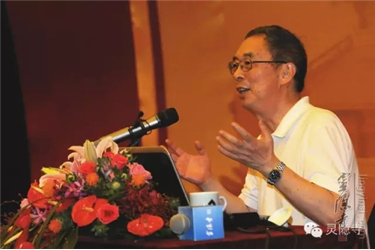
On the afternoon of June 14, 2015, the Yunlin Academy Culture Forum, co-hosted by Lingyin Temple, Tencent Zhejiang Network and Hangzhou Buddhist Academy, was held in the lecture hall of Hangzhou Buddhist Academy. Professor Zhu Qingshi, academician of Chinese Academy of Sciences, attended the forum and shared his views on science and Buddhism in his lecture themed “The Convergence of Science and Buddhism: A Reexamination of Buddhist Sutras from the Perspective of Modern Science and Technology”.

His opinion formed on an amplitude of scientific information presented, Professor Zhu Qingshi stated that the findings of modern scientific research have proved to be considerably similar to the state described in Heart Sutra: “the five skandhas are empty”. Subtle coincidence has also been observed between the statistics, experimentation and inference of scientific research and the approaches of Buddhism. His speech stimulated great interests among the attendees. The venue was packed with over 400 attendees, including the Sangha of Hangzhou Buddhist Academy and lay Buddhists from all around. Master Huiguan of Hangzhou Buddhist Academy hosted the lecture.

The audience

Attendees raising questions
Professor Zhu Qingshi is a physical chemist, Academician of the Chinese Academy of Sciences, and member of the Third World Academy of Sciences. He was the President of the University of Science and Technology from 1998 to 2008, and then he became, in September 2009, the Founding President of South University of Science and Technology of China (SUSTC) at Shenzhen. In his career as a renowned higher education leader in China, Zhu has been committed to developing a world-class research university and cultivating innovative talents. After taking the helm of SUSTC, he has advocated enlivening the university ideas of academic excellence, academic freedom and self-regulation of scholars. Under his leadership, the new university upholds the central position of academic work within the university, experiments on mechanisms for innovative interdisciplinary work, and steadily makes progress with lawmaking for the governance of a modern university.
Zhu has been a visiting fellow at several top overseas labs, including at the University of Oxford, the University of Cambridge, the University of California at Santa Barbara, the Massachusetts Institute of Technology, National Research Council Canada and Université Paris-Sud 11.